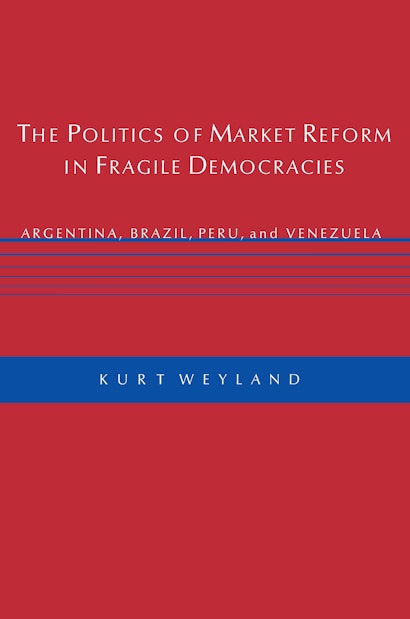This book takes a powerful new approach to a question central to comparative politics and economics: Why do some leaders of fragile democracies attain political success—culminating in reelection victories—when pursuing drastic, painful economic reforms while others see their political careers implode? Kurt Weyland examines, in particular, the surprising willingness of presidents in four Latin American countries to enact daring reforms and the unexpected resultant popular support. He argues that only with the robust cognitive-psychological insights of prospect theory can one fully account for the twists and turns of politics and economic policy in Argentina, Brazil, Peru, and Venezuela during the 1980s and 1990s.
Assessing conventional approaches such as rational choice, Weyland concludes that prospect theory is vital to any systematic attempt to understand the politics of market reform. Under this theory, if actors perceive themselves to be in a losing situation they are inclined toward risks; if they see a winning situation around them, they prefer caution.
In Latin America, Weyland finds, where the public faced an open crisis it backed draconian reforms. And where such reforms yielded an apparent economic recovery, many citizens and their leaders perceived prospects of gains. Successful leaders thus won reelection and the new market model achieved political sustainability. Weyland concludes this accessible book by considering when his novel approach can be used to study crises generally and how it might be applied to a wider range of cases from Latin America, Africa, and Eastern Europe.
Awards and Recognition
- One of Choice's Outstanding Academic Titles for 2003
Kurt Weyland is Associate Professor of Government at the University of Texas at Austin. He is the author of Democracy without Equity: Failures of Reform in Brazil.
"Anyone interested in the politics of public policy should read Weyland's clearly written, stimulating book, which combines theoretical novelty with substantive breath yet gives other theoretical approaches clear and reasonably fair treatment."—Choice
"The Politics of Market Reforms in Fragile Democracies stands out as being by far the most comprehensive and theoretically insightful work on market reform to date. It is an example of first-class scholarship in breadth and scope. It challenges existing theories and provides a brilliant explanation that in many ways is able to integrate previous findings in a simple yet parsimonious way. This book will be a point of departure for anyone who is interested in market reforms in the years to come."—Luigi Manzetti, Perspectives on Politics
"Kurt Weyland has written an important book. From now on, it will be very hard to write about Argentina, Brazil, Peru, and Venezuela or about complex political transitions without relying on the findings and insights that he offers here."—Moises Naim, Editor in Chief, Foreign Policy Magazine
"This is a truly original book. Weyland draws on the rich literature of cognitive psychology and behavioral economics to undertake a careful and illuminating analysis of decisions to initiate, or not, economic adjustment policies in several contemporary Latin American countries. He contrasts his innovative approach with the ones prevailing in the literature, and persuades me that his approach accounts much better for these policies than do the others. The value of this book goes well beyond the countries and the policies it discusses—this is comparative political theory at its most fruitful."—Guillermo O'Donnell, University of Notre Dame
"This is an excellent and original piece of work—a very solid piece of scholarship and clearly a contribution to the literature on the politics of reform. It fits in nicely with the tradition established first by Joan Nelson and colleagues, and then by Haggard and Kaufman."—Carol Graham, Brookings Institution, author of Private Markets for Public Goods
"This book makes a very significant contribution to the field. It is rare that a book is so ambitious in terms of both its breadth of empirical material and its effort to apply a theoretical framework that is, in this context, quite original. At a time when rational choice theories are increasingly dominant in comparative politics, the introduction of an alternative microlevel theory is quite refreshing. Weyland writes very well, in a clear and easy-to-read style that makes the theoretical chapters, in particular, especially accessible to those unfamiliar with the material."—Philip Oxhorn, McGill University, author of Organizing Civil Society

